2025年中考英语复习课件名词(共46张PPT)
文档属性
| 名称 | 2025年中考英语复习课件名词(共46张PPT) |
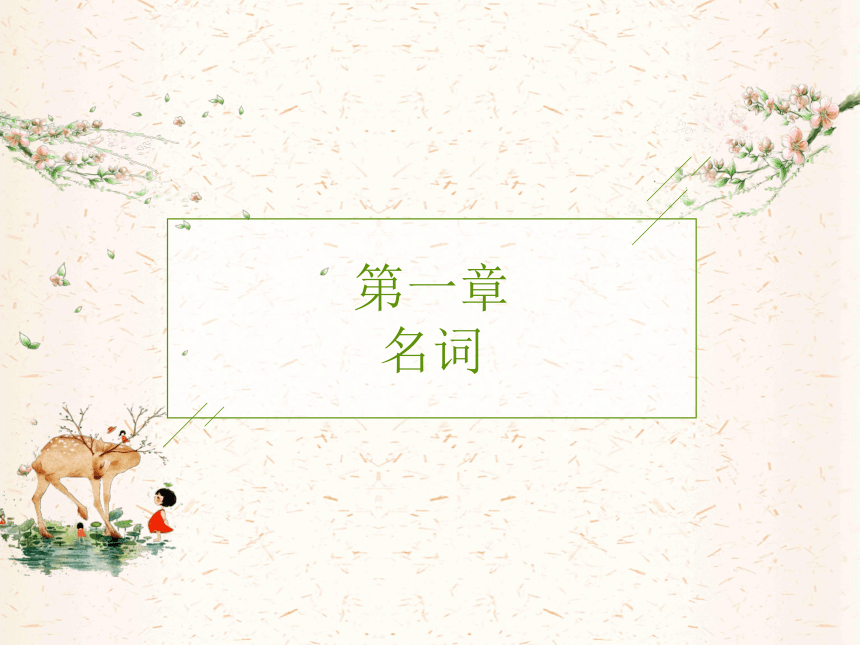
|
|
| 格式 | pptx | ||
| 文件大小 | 4.1MB | ||
| 资源类型 | 教案 | ||
| 版本资源 | 通用版 | ||
| 科目 | 英语 | ||
| 更新时间 | 2025-06-20 00:00:00 | ||
图片预览

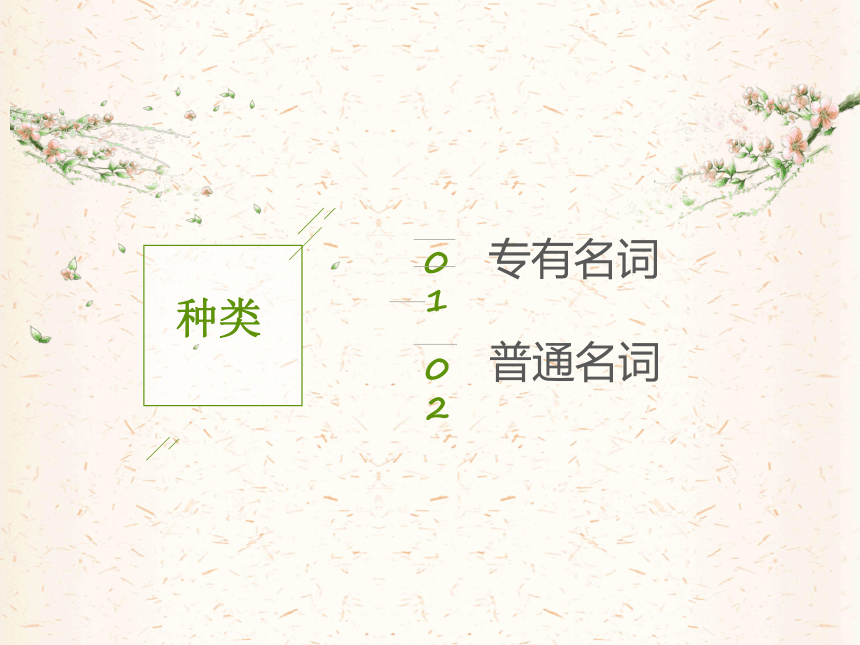
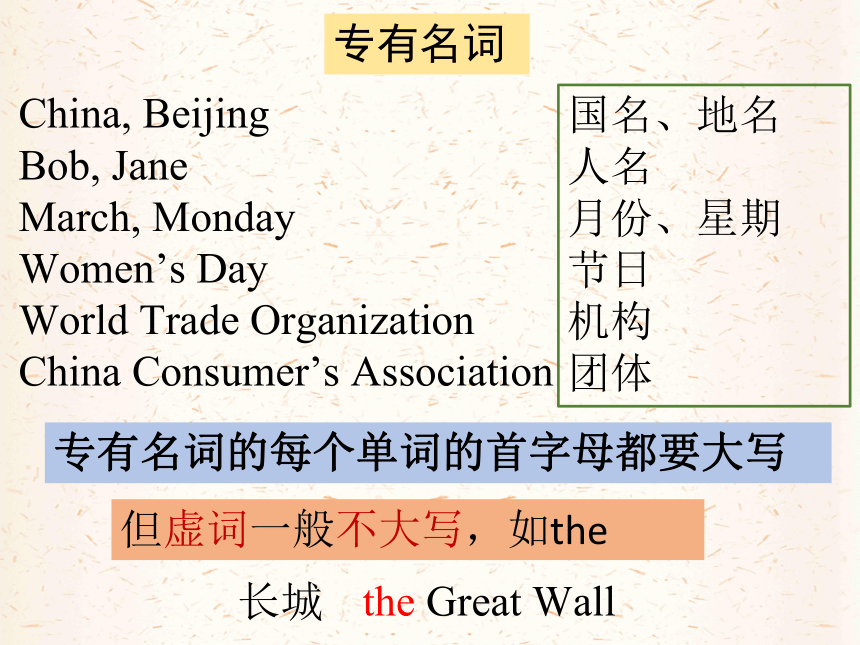
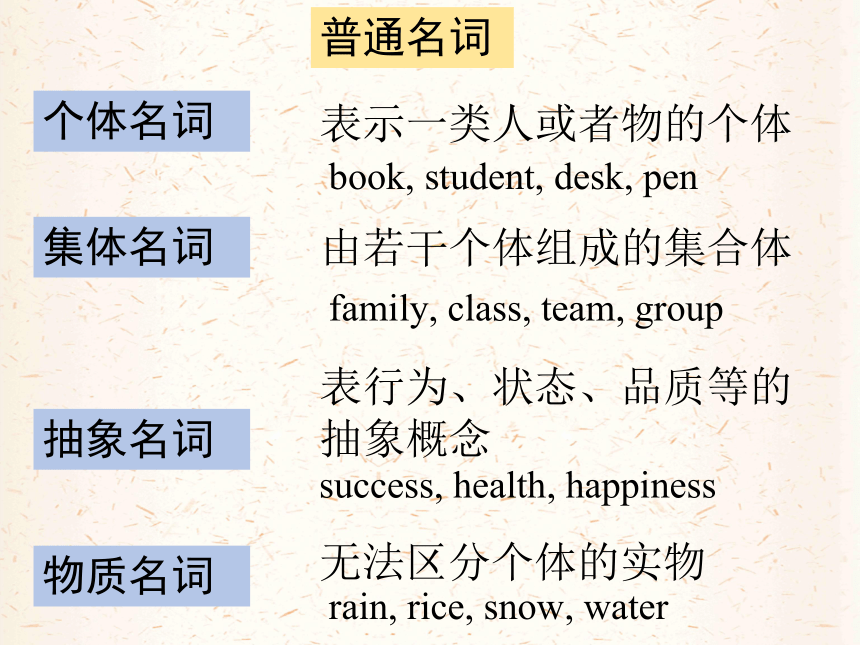
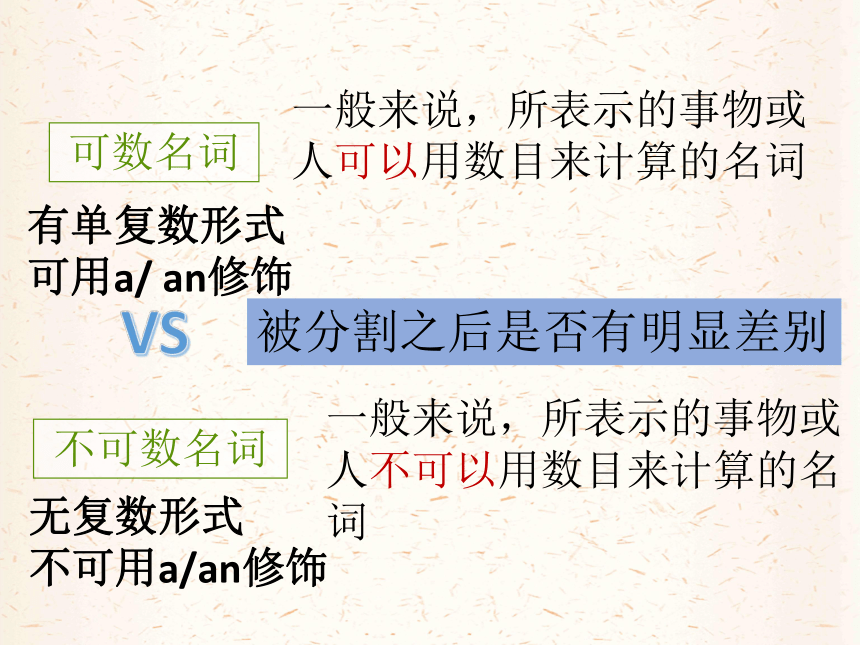
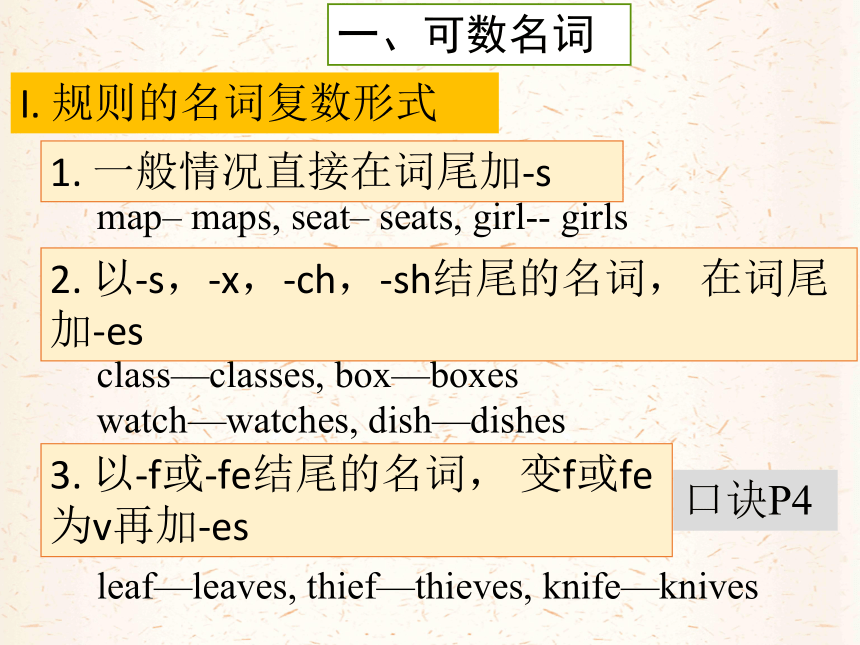

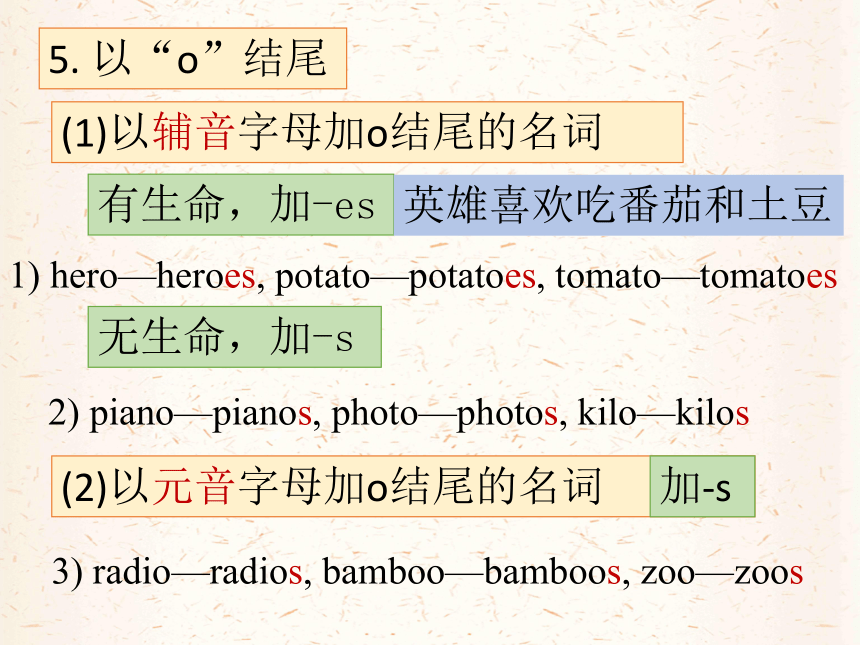


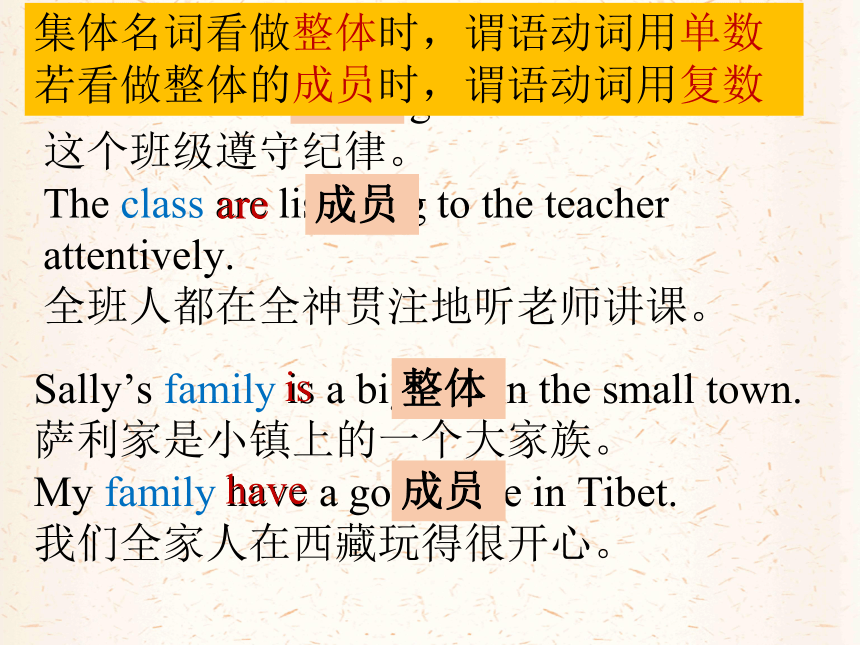
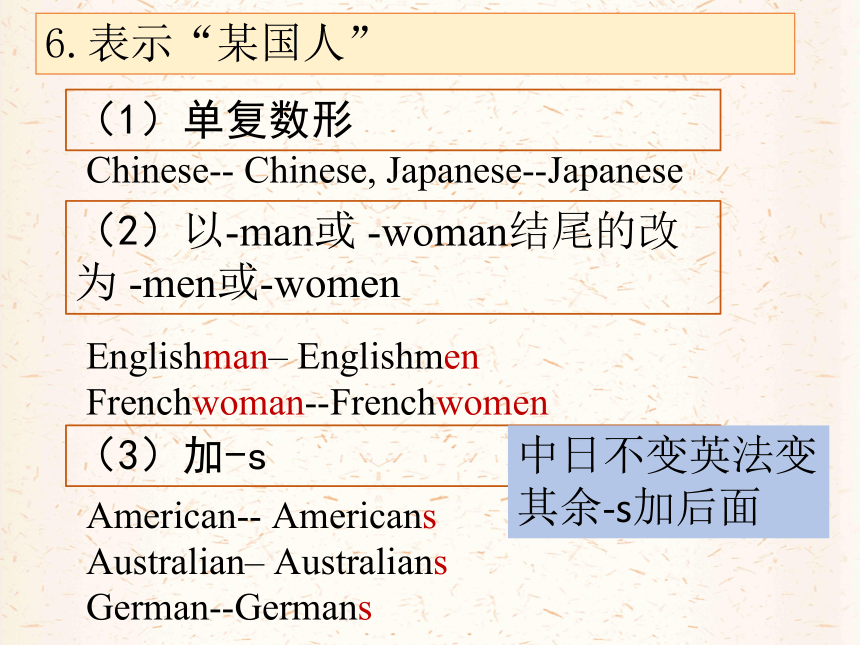
文档简介
(共46张PPT)
第一章
名词
种类
01
专有名词
02
普通名词
专有名词
China, Beijing
Bob, Jane
March, Monday
Women’s Day
World Trade Organization
China Consumer’s Association
国名、地名
人名
月份、星期
节日
机构
团体
the Great Wall
专有名词的每个单词的首字母都要大写
长城
但虚词一般不大写,如the
普通名词
个体名词
集体名词
抽象名词
物质名词
表示一类人或者物的个体
由若干个体组成的集合体
表行为、状态、品质等的抽象概念
无法区分个体的实物
book, student, desk, pen
family, class, team, group
success, health, happiness
rain, rice, snow, water
可数名词
VS
不可数名词
一般来说,所表示的事物或人可以用数目来计算的名词
一般来说,所表示的事物或人不可以用数目来计算的名词
有单复数形式
可用a/ an修饰
无复数形式
不可用a/an修饰
被分割之后是否有明显差别
一、可数名词
I. 规则的名词复数形式
map– maps, seat– seats, girl-- girls
class—classes, box—boxes
watch—watches, dish—dishes
leaf—leaves, thief—thieves, knife—knives
1. 一般情况直接在词尾加-s
2. 以-s,-x,-ch,-sh结尾的名词, 在词尾加-es
3. 以-f或-fe结尾的名词, 变f或fe为v再加-es
口诀P4
(1)以辅音+y结尾的名词,变y为i再加-es
party—parties, story—stories, city—cities
4. 以y结尾
(2)以元音字母加y结尾的名词,加-s
toy—toys, boy—boys, day—days
5. 以“o”结尾
(1)以辅音字母加o结尾的名词
无生命,加-s
有生命,加-es
1) hero—heroes, potato—potatoes, tomato—tomatoes
2) piano—pianos, photo—photos, kilo—kilos
英雄喜欢吃番茄和土豆
(2)以元音字母加o结尾的名词
3) radio—radios, bamboo—bamboos, zoo—zoos
加-s
II. 不规则的名词复数形式
man—men, foot—feet, child--children
1.改变词中的元音字母或其他形式变化
sheep—sheep, deer—deer, fish—fish
2.单复数同形
trousers, clothes, chopsticks
3.常以复数形式出现
people, police
4.一些集体名词形式上为单数,意义为复数
5.部分集体名词既可以作单数(指整体)也可以作复数(指成员)
强调整体 强调成员
class 班级 全班人
family 家庭 家庭成员
couple 一对 个体
group 组织 组员
team 队伍 队员
This class is following the rules.
这个班级遵守纪律。
The class are listening to the teacher attentively.
全班人都在全神贯注地听老师讲课。
Sally’s family is a big one in the small town.
萨利家是小镇上的一个大家族。
My family have a good time in Tibet.
我们全家人在西藏玩得很开心。
is
are
is
have
整体
成员
整体
成员
集体名词看做整体时,谓语动词用单数
若看做整体的成员时,谓语动词用复数
6.表示“某国人”
Chinese-- Chinese, Japanese--Japanese
Englishman– Englishmen
Frenchwoman--Frenchwomen
American-- Americans
Australian– Australians
German--Germans
(1)单复数形
(2)以-man或 -woman结尾的改为 -men或-women
(3)加-s
中日不变英法变
其余-s加后面
Tips
单复数同形的有哪些呢?
Chinese, Japanese, fish, deer, sheep
Chinese and Japanese喜欢吃 fish, deer and sheep
7.合成名词或名词作定语时
一般情况下将最后一个名词变复数
boy student– boy students
apple tree– apple trees
woman doctor– women doctors
man nurse– men nurses
如果第一个名词是man或woman时, 两个名词都要变复数
physics
mathematics / maths
the United States,
news
bus
物理
数学
美国
新闻
公交车
8.以-s结尾,不一定就是可数名词复数 可能是单数或不可数名词
Practice
写出下列名词的复数形式
mouse
goose
kangaroo
deer
tomato
bus
housewife
fish
mice
geese
kangaroos
deer
tomatoes
buses
housewives
fish
1. He has four , All of them can brush their by themselves.
children; tooth
children; teeth
child; teeth
child; tooth
2. A group of are talking with two .
German; Frenchmen
Frenchmen; Germans
Frenchman; German
Germans; Frenchman
B
B
二、不可数名词
help, information, education, money, news, homework
milk, water, butter, bread, pork, rice
1.饮食
wood, gold, silk, metal
rain, snow, wind, grass, weather
2.材料
3.自然
4.其他
是否所有的不可数名词都只能不可数呢?
当然不是!
She looked up in surprise.
她惊讶地抬起头。
I have a surprise for you!
我要告诉你一件意想不到的事情!
1.表示情绪、情感的词,强调具体的人或事时常将名词具体化使用,可作可数名词。
2.在固定搭配中
have a rest 休息 catch a cold 感冒
可数名词&不可数名词
1) A glass is made of glass.
玻璃杯是由玻璃制成的。
2) I like eating oranges, but I don’t like drinking orange.
我喜欢吃橙子,但我不喜欢喝橙汁。
3.同形异义
P5的第3.点
三、量的表达
常用的量词:
glass 玻璃杯
cup 茶杯
bottle 瓶
bowl 碗
piece 片,块,张
box 盒,箱
bag 袋
plate 盘
tin 听,灌
kilo 公斤
a glass of milk/ water
a cup of tea/ coffee
一杯牛奶
两杯茶
三片面包
四碗饭
五箱苹果
六斤鸡蛋
基数词+量词+of+名词
a glass of milk
two cups of tea
three pieces of bread
four bowls of rice
five boxes of apples
three kilos of eggs
1) A bottle of water is not enough. But three bottles of water are OK.
一瓶水不够,但三瓶水就可以了。
2) A box of apples is too heavy for me to carry.
一箱的苹果太重了,我搬不动。
is
is
are
当名词前有量词限定时,谓语动词的单复数要与量词保持一致
词义 修饰可数&不可数 只能修饰可数名词 只修饰不可数名词
几乎没有
一些, 几个
许多, 大量
a few,
several
little
some, any
a lot of
= lots of,
plenty of
few
many,
a number of
a little,
a bit of
much
不定代词或固定短语来表达数量
A kilo of apples 10 yuan. Two bags of milk 9 yuan. They are 19 yuan together.
are; are
are; is
is; are
is; is
Practice
C
( )1. —What can I do for you, Sir
—________, please.
A. Two pair of socks
B. Two baskets of apple
C. Two pairs of sock
D. Two baskets of apples
( )2. What good______! I have passed the test to get a driver's license.
A. advice B. fact C. news D. report
D
C
( )3. —Do you know the woman who is looking over the patient
—Yes, she is one of the best________ in our hospital.
A. woman doctor
B. women doctors
C. woman doctors
D. women doctor
B
三、名词所有格
Lucy’s father; the boy’s room
Children’s Day; women’s right
1.不以-s结尾的名词, 词尾加’s
the girls’ desk; Teachers’ Day
2.以-s结尾的名词, 词尾加’s
at Tom’s在汤姆的家
at the doctor’s 在医务室
3.表示“某人的家”、“医务室”或“店铺”时,所有格后不出现所修饰的名词
I ’s所有格的构成(有生命)
Tom and Tim’s room is very clean.
汤姆和蒂姆的房间很干净。
Jane and Mary’s friends are very nice.
简和玛丽的朋友很好。
Lucy’s and Lily’s rooms are vey big.
露西和莉莉的房间都很大。
4.“分别有”在每个名词后加 ’s
5.“共有”在最后一个名词后加 ’s
谓语动词用复数
谓语动词由所有格后的名词单复数决定
are
are
is
II ’s所有格的构成(无生命)
today's newspaper, 25 minutes' walk
the country's plan, the world's population
1.用于表示时间的名词后
2.用于表示国家、城市等地方的名词后
a mile's journey, five dollars' apples
3.用于表示距离、价格等的名词后
III of 所有格
the main idea of the story 故事的主要意思
the flowers of the tree 树的花
the leg of the chair 椅子的腿
1. 用于表示无生命的名词之后
the books of the students sitting near the windows 坐在窗边的学生的书
2. 用于表示有生命的名词之后,尤其是较长定语时
IV 双重所有格
a friend of my father’s
我父亲的一位朋友
several classmates of Tom’s
汤姆的几位同学
the answer to the question 问题的答案
the key to success 成功的关键
1. 一般情况用“of”表示所属关系
2. 少数名词用“to”表示所属关系
Practice
( ) 1. _____ mothers work in the same hospital.
A. Tim and Peter's B. Tim's and Peter C. Tim's and Peter's D. Tim and Peter
( )2. Every morning Mr. Smith takes a____ to his office.
A. 20 minutes' walks B. 20 minute's walk
C. 20-minutes walk D. 20-minute walk
C
D
( )3. September 10th is________.
A. Children Day B. Teachers' Day
C. Teacher's Day D. Womens' Day
( )4. Look at the big and clean room. It's ________.
A. Lucy and Lily B. Lucy's and Lily's C. Lucy's and Lily D. Lucy and Lily's
B
D
四、名词辨析
1. work和job
work“工作”,多指体力的或脑力的努力或活动,为不可数名词;job“工作,职业”,多指为换取报酬而进行的日常活动,为可数名词。
A teacher has much ________ every day, such as preparing for classes, checking homework and talking to students. 一个老师每天都有很多工作,例如备课、检查作业及和学生谈话。
She is looking for a ________ as a reporter in Beijing. 她正在北京找一份记者的工作。
【即学即练】
work
job
2. cook和cooker
cook n. “厨师”, v. “烹饪”; cooker “厨具”。
He is the best ________ in our town. 他是我们镇最好的厨师。
My ________ is broken, so I have to go out for dinner tonight. 我的厨具坏了, 所以今晚只能出去吃饭。
【即学即练】
cook
cooker
3. problem和question
problem总是与“困难”相联系,通常指客观上存在的等待解决的问题,尤其指比较棘手的难题;question总是与“疑问、质问、询问”相联系,通常指人主观上产生的需要得到解答或解释的问题或疑问。
He had some __________ walking after he broke his leg. 他伤了他的腿后走路有点困难了。
I always ask a lot of __________ in class because I think it's good for my study.
我总是在课堂上问很多问题, 因为我认为这对我学习很有好处。
【即学即练】
problems
questions
4. sound, voice和noise
sound指自然界各种各样的声音;
voice指人的嗓音;
noise指噪音。
Can you hear the ________ of opening the door Will there be a thief
你能听到开门的声音吗?会不会有贼呢?
The loud ________ makes me annoyed! 那嘈杂声令我觉得很烦!
Mary has a sweet ________. She can sing very well. 玛丽有甜美的嗓音。她唱歌唱得很好。
【即学即练】
sound
noise
voice
5. road, street和way
road指具体的公路、马路;
street指街道;
way指道路、途径。
Be careful when you cross the ________. 当你过马路的时候要小心。
Excuse me, can you tell me the ________ to the library 不好意思, 请问你能不能告诉我去图书馆的路?
There are many flowers on both sides of the ________. 在街道的两旁有很多花。
【即学即练】
road
way
street
6. home, house和family
home指家,包括住处和家人;
house指房子、住宅;
family指家庭、家庭成员。
I don't want to be away from ________ for too long. 我不想离家时间太长。
My ________ is not very big but it is very comfortable. 我的房子不是很大, 但很舒服。
I have a happy ________. 我有一个快乐的家。
【即学即练】
home
house
family
7. population, people, person
population 指人口;
people指具体的人,总用作复数;
person指具体的一个人。
China has a large ____________. 中国有很多人。
Chinese ________ are friendly. 中国人很友好。
Mary is an honest ________. 玛丽是一个诚实的人。
【即学即练】
population
people
person
8. amount和number
amount, number都指数量、总量,
amount后接不可数名词,
number后接可数名词。
He wants to borrow a(n) ________ of money from me. 他想从我这里借一笔钱。
A(n) ________ of fans are waiting for the pop star at the airport. 大量粉丝在机场等那个明星。
【即学即练】
amount
number
1) The number of tourists to London has dropped by 100,000.
去伦敦的游客数量减少了10万。
2)The number of waste becomes more and more.
垃圾的数量变得越来越多。
3) A number of students are planting the trees on the hill.
许多学生正在山上种树。
the number of ……的数量,谓语动词用单数;
a number of 许多;大量,谓语动词用复数
谢谢观看
第一章
名词
种类
01
专有名词
02
普通名词
专有名词
China, Beijing
Bob, Jane
March, Monday
Women’s Day
World Trade Organization
China Consumer’s Association
国名、地名
人名
月份、星期
节日
机构
团体
the Great Wall
专有名词的每个单词的首字母都要大写
长城
但虚词一般不大写,如the
普通名词
个体名词
集体名词
抽象名词
物质名词
表示一类人或者物的个体
由若干个体组成的集合体
表行为、状态、品质等的抽象概念
无法区分个体的实物
book, student, desk, pen
family, class, team, group
success, health, happiness
rain, rice, snow, water
可数名词
VS
不可数名词
一般来说,所表示的事物或人可以用数目来计算的名词
一般来说,所表示的事物或人不可以用数目来计算的名词
有单复数形式
可用a/ an修饰
无复数形式
不可用a/an修饰
被分割之后是否有明显差别
一、可数名词
I. 规则的名词复数形式
map– maps, seat– seats, girl-- girls
class—classes, box—boxes
watch—watches, dish—dishes
leaf—leaves, thief—thieves, knife—knives
1. 一般情况直接在词尾加-s
2. 以-s,-x,-ch,-sh结尾的名词, 在词尾加-es
3. 以-f或-fe结尾的名词, 变f或fe为v再加-es
口诀P4
(1)以辅音+y结尾的名词,变y为i再加-es
party—parties, story—stories, city—cities
4. 以y结尾
(2)以元音字母加y结尾的名词,加-s
toy—toys, boy—boys, day—days
5. 以“o”结尾
(1)以辅音字母加o结尾的名词
无生命,加-s
有生命,加-es
1) hero—heroes, potato—potatoes, tomato—tomatoes
2) piano—pianos, photo—photos, kilo—kilos
英雄喜欢吃番茄和土豆
(2)以元音字母加o结尾的名词
3) radio—radios, bamboo—bamboos, zoo—zoos
加-s
II. 不规则的名词复数形式
man—men, foot—feet, child--children
1.改变词中的元音字母或其他形式变化
sheep—sheep, deer—deer, fish—fish
2.单复数同形
trousers, clothes, chopsticks
3.常以复数形式出现
people, police
4.一些集体名词形式上为单数,意义为复数
5.部分集体名词既可以作单数(指整体)也可以作复数(指成员)
强调整体 强调成员
class 班级 全班人
family 家庭 家庭成员
couple 一对 个体
group 组织 组员
team 队伍 队员
This class is following the rules.
这个班级遵守纪律。
The class are listening to the teacher attentively.
全班人都在全神贯注地听老师讲课。
Sally’s family is a big one in the small town.
萨利家是小镇上的一个大家族。
My family have a good time in Tibet.
我们全家人在西藏玩得很开心。
is
are
is
have
整体
成员
整体
成员
集体名词看做整体时,谓语动词用单数
若看做整体的成员时,谓语动词用复数
6.表示“某国人”
Chinese-- Chinese, Japanese--Japanese
Englishman– Englishmen
Frenchwoman--Frenchwomen
American-- Americans
Australian– Australians
German--Germans
(1)单复数形
(2)以-man或 -woman结尾的改为 -men或-women
(3)加-s
中日不变英法变
其余-s加后面
Tips
单复数同形的有哪些呢?
Chinese, Japanese, fish, deer, sheep
Chinese and Japanese喜欢吃 fish, deer and sheep
7.合成名词或名词作定语时
一般情况下将最后一个名词变复数
boy student– boy students
apple tree– apple trees
woman doctor– women doctors
man nurse– men nurses
如果第一个名词是man或woman时, 两个名词都要变复数
physics
mathematics / maths
the United States,
news
bus
物理
数学
美国
新闻
公交车
8.以-s结尾,不一定就是可数名词复数 可能是单数或不可数名词
Practice
写出下列名词的复数形式
mouse
goose
kangaroo
deer
tomato
bus
housewife
fish
mice
geese
kangaroos
deer
tomatoes
buses
housewives
fish
1. He has four , All of them can brush their by themselves.
children; tooth
children; teeth
child; teeth
child; tooth
2. A group of are talking with two .
German; Frenchmen
Frenchmen; Germans
Frenchman; German
Germans; Frenchman
B
B
二、不可数名词
help, information, education, money, news, homework
milk, water, butter, bread, pork, rice
1.饮食
wood, gold, silk, metal
rain, snow, wind, grass, weather
2.材料
3.自然
4.其他
是否所有的不可数名词都只能不可数呢?
当然不是!
She looked up in surprise.
她惊讶地抬起头。
I have a surprise for you!
我要告诉你一件意想不到的事情!
1.表示情绪、情感的词,强调具体的人或事时常将名词具体化使用,可作可数名词。
2.在固定搭配中
have a rest 休息 catch a cold 感冒
可数名词&不可数名词
1) A glass is made of glass.
玻璃杯是由玻璃制成的。
2) I like eating oranges, but I don’t like drinking orange.
我喜欢吃橙子,但我不喜欢喝橙汁。
3.同形异义
P5的第3.点
三、量的表达
常用的量词:
glass 玻璃杯
cup 茶杯
bottle 瓶
bowl 碗
piece 片,块,张
box 盒,箱
bag 袋
plate 盘
tin 听,灌
kilo 公斤
a glass of milk/ water
a cup of tea/ coffee
一杯牛奶
两杯茶
三片面包
四碗饭
五箱苹果
六斤鸡蛋
基数词+量词+of+名词
a glass of milk
two cups of tea
three pieces of bread
four bowls of rice
five boxes of apples
three kilos of eggs
1) A bottle of water is not enough. But three bottles of water are OK.
一瓶水不够,但三瓶水就可以了。
2) A box of apples is too heavy for me to carry.
一箱的苹果太重了,我搬不动。
is
is
are
当名词前有量词限定时,谓语动词的单复数要与量词保持一致
词义 修饰可数&不可数 只能修饰可数名词 只修饰不可数名词
几乎没有
一些, 几个
许多, 大量
a few,
several
little
some, any
a lot of
= lots of,
plenty of
few
many,
a number of
a little,
a bit of
much
不定代词或固定短语来表达数量
A kilo of apples 10 yuan. Two bags of milk 9 yuan. They are 19 yuan together.
are; are
are; is
is; are
is; is
Practice
C
( )1. —What can I do for you, Sir
—________, please.
A. Two pair of socks
B. Two baskets of apple
C. Two pairs of sock
D. Two baskets of apples
( )2. What good______! I have passed the test to get a driver's license.
A. advice B. fact C. news D. report
D
C
( )3. —Do you know the woman who is looking over the patient
—Yes, she is one of the best________ in our hospital.
A. woman doctor
B. women doctors
C. woman doctors
D. women doctor
B
三、名词所有格
Lucy’s father; the boy’s room
Children’s Day; women’s right
1.不以-s结尾的名词, 词尾加’s
the girls’ desk; Teachers’ Day
2.以-s结尾的名词, 词尾加’s
at Tom’s在汤姆的家
at the doctor’s 在医务室
3.表示“某人的家”、“医务室”或“店铺”时,所有格后不出现所修饰的名词
I ’s所有格的构成(有生命)
Tom and Tim’s room is very clean.
汤姆和蒂姆的房间很干净。
Jane and Mary’s friends are very nice.
简和玛丽的朋友很好。
Lucy’s and Lily’s rooms are vey big.
露西和莉莉的房间都很大。
4.“分别有”在每个名词后加 ’s
5.“共有”在最后一个名词后加 ’s
谓语动词用复数
谓语动词由所有格后的名词单复数决定
are
are
is
II ’s所有格的构成(无生命)
today's newspaper, 25 minutes' walk
the country's plan, the world's population
1.用于表示时间的名词后
2.用于表示国家、城市等地方的名词后
a mile's journey, five dollars' apples
3.用于表示距离、价格等的名词后
III of 所有格
the main idea of the story 故事的主要意思
the flowers of the tree 树的花
the leg of the chair 椅子的腿
1. 用于表示无生命的名词之后
the books of the students sitting near the windows 坐在窗边的学生的书
2. 用于表示有生命的名词之后,尤其是较长定语时
IV 双重所有格
a friend of my father’s
我父亲的一位朋友
several classmates of Tom’s
汤姆的几位同学
the answer to the question 问题的答案
the key to success 成功的关键
1. 一般情况用“of”表示所属关系
2. 少数名词用“to”表示所属关系
Practice
( ) 1. _____ mothers work in the same hospital.
A. Tim and Peter's B. Tim's and Peter C. Tim's and Peter's D. Tim and Peter
( )2. Every morning Mr. Smith takes a____ to his office.
A. 20 minutes' walks B. 20 minute's walk
C. 20-minutes walk D. 20-minute walk
C
D
( )3. September 10th is________.
A. Children Day B. Teachers' Day
C. Teacher's Day D. Womens' Day
( )4. Look at the big and clean room. It's ________.
A. Lucy and Lily B. Lucy's and Lily's C. Lucy's and Lily D. Lucy and Lily's
B
D
四、名词辨析
1. work和job
work“工作”,多指体力的或脑力的努力或活动,为不可数名词;job“工作,职业”,多指为换取报酬而进行的日常活动,为可数名词。
A teacher has much ________ every day, such as preparing for classes, checking homework and talking to students. 一个老师每天都有很多工作,例如备课、检查作业及和学生谈话。
She is looking for a ________ as a reporter in Beijing. 她正在北京找一份记者的工作。
【即学即练】
work
job
2. cook和cooker
cook n. “厨师”, v. “烹饪”; cooker “厨具”。
He is the best ________ in our town. 他是我们镇最好的厨师。
My ________ is broken, so I have to go out for dinner tonight. 我的厨具坏了, 所以今晚只能出去吃饭。
【即学即练】
cook
cooker
3. problem和question
problem总是与“困难”相联系,通常指客观上存在的等待解决的问题,尤其指比较棘手的难题;question总是与“疑问、质问、询问”相联系,通常指人主观上产生的需要得到解答或解释的问题或疑问。
He had some __________ walking after he broke his leg. 他伤了他的腿后走路有点困难了。
I always ask a lot of __________ in class because I think it's good for my study.
我总是在课堂上问很多问题, 因为我认为这对我学习很有好处。
【即学即练】
problems
questions
4. sound, voice和noise
sound指自然界各种各样的声音;
voice指人的嗓音;
noise指噪音。
Can you hear the ________ of opening the door Will there be a thief
你能听到开门的声音吗?会不会有贼呢?
The loud ________ makes me annoyed! 那嘈杂声令我觉得很烦!
Mary has a sweet ________. She can sing very well. 玛丽有甜美的嗓音。她唱歌唱得很好。
【即学即练】
sound
noise
voice
5. road, street和way
road指具体的公路、马路;
street指街道;
way指道路、途径。
Be careful when you cross the ________. 当你过马路的时候要小心。
Excuse me, can you tell me the ________ to the library 不好意思, 请问你能不能告诉我去图书馆的路?
There are many flowers on both sides of the ________. 在街道的两旁有很多花。
【即学即练】
road
way
street
6. home, house和family
home指家,包括住处和家人;
house指房子、住宅;
family指家庭、家庭成员。
I don't want to be away from ________ for too long. 我不想离家时间太长。
My ________ is not very big but it is very comfortable. 我的房子不是很大, 但很舒服。
I have a happy ________. 我有一个快乐的家。
【即学即练】
home
house
family
7. population, people, person
population 指人口;
people指具体的人,总用作复数;
person指具体的一个人。
China has a large ____________. 中国有很多人。
Chinese ________ are friendly. 中国人很友好。
Mary is an honest ________. 玛丽是一个诚实的人。
【即学即练】
population
people
person
8. amount和number
amount, number都指数量、总量,
amount后接不可数名词,
number后接可数名词。
He wants to borrow a(n) ________ of money from me. 他想从我这里借一笔钱。
A(n) ________ of fans are waiting for the pop star at the airport. 大量粉丝在机场等那个明星。
【即学即练】
amount
number
1) The number of tourists to London has dropped by 100,000.
去伦敦的游客数量减少了10万。
2)The number of waste becomes more and more.
垃圾的数量变得越来越多。
3) A number of students are planting the trees on the hill.
许多学生正在山上种树。
the number of ……的数量,谓语动词用单数;
a number of 许多;大量,谓语动词用复数
谢谢观看
同课章节目录
- 词法
- 名词
- 动词和动词短语
- 动词语态
- 动词时态
- 助动词和情态动词
- 非谓语动词
- 冠词
- 代词
- 数词和量词
- 形容词副词及其比较等级
- 介词和介词短语
- 连词和感叹词
- 构词法
- 相似、相近词比较
- 句法
- 陈述句
- 一般疑问句和否定疑问句
- 特殊疑问句及选择疑问句
- 反意疑问句
- 存在句(There be句型)
- 宾语从句
- 定语从句
- 状语从句
- 主谓一致问题
- 简单句
- 并列句
- 复合句
- 主谓一致
- 主、表语从句
- 名词性从句
- 直接引语和间接引语
- 虚拟语气
- 感叹句
- 强调句
- 倒装句
- 祈使句
- 句子的成分
- 句子的分类
- 题型专区
- 单项选择部分
- 易错题
- 完形填空
- 阅读理解
- 词汇练习
- 听说训练
- 句型转换
- 补全对话
- 短文改错
- 翻译
- 书面表达
- 任务型阅读
- 语法填空
- 其他资料
